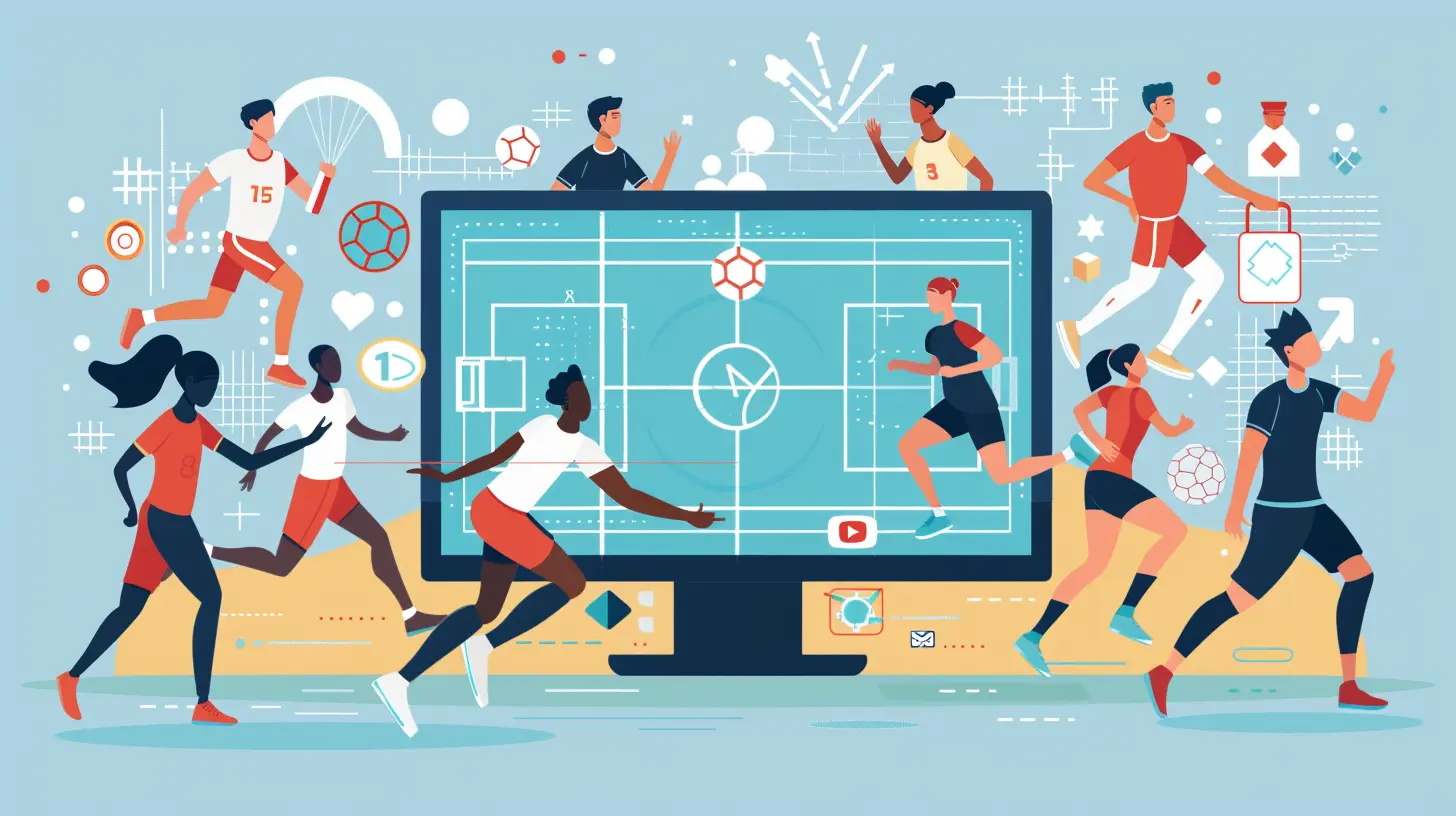8 April 2025
In recent years, sports startups have exploded onto the scene, bringing fresh ideas and innovative technology to an industry that, for the most part, has stayed rooted in tradition. From how athletes train to how fans engage with their favorite teams, startups are flipping the script and making waves. But nowhere is this more evident than in the realm of training methods. These young companies are pushing boundaries, disrupting old-school approaches, and changing the way athletes prepare for competition at every level.
So, how exactly are sports startups shaking things up? Let's dive in.

The Traditional Approach to Sports Training
For decades, sports training has followed a pretty rigid formula. Athletes train hard, follow structured routines, and rely on coaches to guide them through drills and exercises. While effective, these methods can be somewhat limiting. There’s a one-size-fits-all approach that doesn’t necessarily account for the individual needs of each athlete.Think about it: coaches have to manage entire teams, which means they often can’t give personalized attention to each player. Training schedules lack flexibility, and feedback is generally limited to what the coach observes during practice. Sure, it's worked for generations, but in a world where technology is advancing at lightning speed, why should athletes settle for the status quo?
This is where sports startups come into play — quite literally.

Sports Startups: The Game-Changers
Sports startups are like the underdog in a sports movie — scrappy, innovative, and hungry to make a difference. They’re using cutting-edge technology to create personalized, data-driven training solutions that cater to individual needs. Whether it’s through wearable tech, AI-driven performance analysis, or virtual coaching, these companies are changing the game and giving athletes a competitive edge.Let’s break down some of the key ways sports startups are disrupting traditional training methods:
1. Wearable Technology: Tracking Performance In Real-Time
Wearable tech has become a game-changer for athletes looking to optimize their workouts. Devices like smartwatches, fitness trackers, and sensor-laden clothing provide real-time data on everything from heart rate and calorie burn to sleep patterns and muscle activity.Gone are the days of guessing whether you’re improving or not. Now, athletes can track every movement, every heartbeat, and every moment of rest with precision. Companies like WHOOP, Fitbit, and Motus Global are leading the charge in this space, providing insights that help athletes fine-tune their performance like never before.
And it’s not just about tracking stats. These devices can also detect potential injuries before they happen. Imagine knowing you’re about to pull a hamstring before it even occurs — that’s next-level prevention. With startups like Catapult Sports developing tech that monitors biomechanical data, athletes can make smarter decisions about when to push harder and when to take a step back.
2. AI-Powered Coaching: Your Personal Trainer in Your Pocket
Artificial intelligence is making its mark everywhere, and sports training is no exception. AI-powered platforms are providing athletes with personalized workout plans, analyzing performance, and offering real-time feedback — all without the need for a human coach.Take Freeletics, for example. This AI-driven app creates tailored training programs based on your fitness level, goals, and feedback from previous workouts. The more you use it, the smarter it gets, adapting to your performance and pushing you just the right amount. It’s like having a coach who knows you better than you know yourself.
But it doesn’t stop there. AI-based tools like Zone7 use predictive analytics to assess an athlete’s risk of injury and provide actionable insights on how to avoid it. With algorithms that learn from thousands of data points, these platforms offer a level of precision that’s impossible for even the most experienced human coaches to replicate.
3. Virtual Reality: Training in a Whole New Dimension
Ever wanted to step into the shoes of your favorite athlete, practice their moves, and experience the game from their perspective? Well, thanks to virtual reality (VR), that’s now a possibility.Sports startups like STRIVR Labs and Rezzil are using VR to simulate game scenarios, allowing athletes to train their minds as well as their bodies. Virtual reality training helps athletes sharpen their decision-making skills in high-pressure situations without the physical toll of traditional practice. It’s like a mental workout with all the intensity of game day, but without the risk of injury.
And it's not just for pro athletes. Even youth sports teams are incorporating VR into their training routines, helping young athletes develop quicker reflexes and better game awareness. It’s like having a full-on practice session in your living room — no cleats required.
4. Data Analytics: The Power of Numbers
In the modern age of sports, data is king. From baseball's famed "Moneyball" approach to the rise of advanced metrics in basketball, analytics have transformed how teams evaluate players and plan strategies. But now, data is playing a starring role in individual training as well.Sports startups are leveraging data analytics to provide athletes with detailed insights into their performance. Companies like Hudl and Kinduct use performance data to create tailored training programs, analyze game footage, and provide athletes with a deeper understanding of their strengths and weaknesses.
For example, let’s say you’re a soccer player. By analyzing your game footage, these platforms can break down your positioning, passing accuracy, and even your decision-making during key moments on the field. With this information, you can focus your training on specific areas, making your practice sessions far more efficient and effective.
5. Recovery Tech: Optimizing Rest and Rehabilitation
Let’s face it — training hard is only half the battle. The other half? Recovery. And sports startups have zeroed in on this crucial aspect of athletic performance.Recovery tech is all about helping athletes bounce back faster and more efficiently. From cryotherapy to muscle compression devices, the goal is to speed up the healing process and reduce downtime between workouts. Companies like NormaTec, Hyperice, and Therabody are leading the charge here, offering tools that help athletes recover like the pros.
But it’s not just about physical recovery. Startups like Calm and Headspace are bringing mindfulness and mental recovery into the spotlight, offering guided meditation and relaxation techniques specifically designed for athletes. After all, mental fatigue can be just as detrimental as physical exhaustion, right?

Why Sports Startups Are Thriving
So, what’s the secret sauce behind the success of sports startups? It all comes down to personalization and accessibility.- Personalization: Traditional training methods often rely on cookie-cutter routines that might not work for everyone. Startups, on the other hand, are offering custom solutions that cater to individual needs. Whether it's wearable tech or AI-powered coaching, athletes can now train in ways that are tailored specifically to their bodies and goals.
- Accessibility: In the past, cutting-edge training techniques were reserved for elite athletes with access to top-tier coaches and facilities. But startups are democratizing sports training, making high-tech solutions available to athletes at all levels. Whether you're a weekend warrior or an aspiring pro, you can now access the same tools and insights that were once out of reach.

The Future of Sports Training
It's clear that sports startups are here to stay. As technology continues to advance, we’re likely to see even more disruptive innovations that challenge traditional training methods.Imagine a future where athletes train in augmented reality environments, wear clothing that actively adapts to their movements, or have AI-driven virtual coaches that follow them throughout their careers. It might sound like science fiction, but with the rapid pace of innovation, it’s closer than you think.
As we look to the future, one thing’s for sure: the way athletes train will never be the same. And if you're an athlete looking to stay ahead of the game, it might be time to embrace the change.
Conclusion
Sports startups are revolutionizing the way athletes train, offering personalized, data-driven solutions that go beyond what traditional methods can provide. From wearable tech and AI-powered coaching to virtual reality and recovery innovations, these companies are paving the way for the future of sports training.The message is clear: technology is no longer just a tool — it’s a teammate. And whether you’re a seasoned pro or just starting your athletic journey, embracing these innovations could be the key to unlocking your full potential.






Davina Morris
Innovative sports startups are revolutionizing training, enhancing performance and accessibility while challenging traditional methods effectively.
April 14, 2025 at 7:38 PM